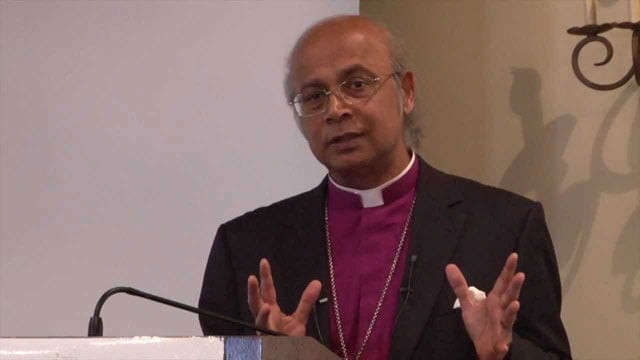‘Religion’s role in politics should be persuasive, not coercive’
Speaker stresses the need to think about ways to expand space for differences of opinion and beliefs

PHOTO: Youtube
Bangladesh Muslims protest call to scrap state religion
These views were expressed by Rt Rev’d Dr Michael Nazir Ali, former Lord Bishop of Rochester, United Kingdom.
He was speaking at the Saving Grace: Freedom, Tolerance and the Challenge of Extremism session at the Afkar-i-Taaza conference.
Nazir Ali said most countries were faced with the problem of working out religion’s proper role in politics. “Religion’s role should be persuasive, not coercive,” he said.
Nazir Ali stressed the need for introducing a bill of rights [in Pakistan] to guarantee fundamental rights for all citizens including those belonging to marginalised and minority groups.
Citing examples from history, he said citizenship rights had been extended to all communities by the government established by Muhammad bin Qasim.
He said as commander of the Arab army he had signed an agreement (known as the Agreement of Ahmadabad) with leaders of Hindu and Buddhist communities saying that non-Muslims were entitled to equal rights because they paid for military protection. He said Qasim’s government had also agreed to protect worship places of these communities. The agreement had been signed on the basis of a fatwa (religious decree) obtained from Muslim jurists, he said.
Qasim had requested the jurists’ guidance on dealing with the two communities, he added.
Nazir Ali said Mughal emperor Aurangzeb Alamghir had abolished 54 taxes on non-Muslims and started provision of funds for maintenance of their worship places. He said most historical accounts of his rule portrayed Aurangzeb as cruel and barbaric because he had killed his brothers. Ashoka had also done that but he is not portrayed as a barbaric ruler, he added.
‘Rightwing feminism rose from Hindutva, Islamist ideologies’
On Muhammad Ali Jinnah’s August 11, 1947, speech, Nazir Ali said it had been a reflection of the Mesak-i-Madina (Agreement of Medina). Referring to the Mujalla-i-Ahkam-i-Sultania (the ordinances of the government), he said that in the Ottomon Empire non-Muslims were qualified to hold all important public offices like the Qazi-ul-Quzat (chief justice).
Earlier, Dr Suheyl Umar of the Iqbal Academy said that the 20th century would be remembered in history as a barbaric century. He said events in the century had ushered in a society where space for difference of opinion and beliefs had diminished. The need of the hour is to think about ways to expand this space, he added.
Published in The Express Tribune, April 2nd, 2016.


















COMMENTS
Comments are moderated and generally will be posted if they are on-topic and not abusive.
For more information, please see our Comments FAQ